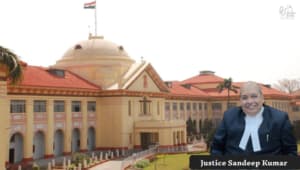In a significant ruling, the Bombay High Court (Aurangabad Bench) has set aside a Family Court order and declared a marriage null and void, after finding that the wife's family had concealed her medical condition cerebral palsy at the time of marriage. The bench comprising Justice Nitin B. Suryawanshi and Justice Sandipkumar C. More delivered its decision on 22 September 2025, allowing the husband's appeal.
Background
The appellant-husband and respondent-wife were married on 28 April 2018 in Chalisgaon, Jalgaon district. Soon after cohabitation, the husband claimed he noticed unusual behavior-long hours of sleep, incontinence, and frequent fainting. Concerned, he arranged medical consultations which revealed the wife was suffering from cerebral palsy, a neurological condition present from birth.
Feeling deceived, he approached the Family Court in 2018, alleging that her family had deliberately suppressed this fact before marriage. The wife, however, denied these allegations, admitting only a congenital weakness in one hand but insisting she was otherwise fit for marital obligations. The Family Court dismissed the husband's petition in August 2023, prompting this appeal.
Court's Observations
The High Court closely examined medical evidence, including a certificate issued by a Medical Board of the Government Medical College, Aurangabad. Dr. Minakshi Bhattacharya, a board member, testified that the wife suffered from left paresis (cerebral palsy) with mild intellectual impairment, a condition incurable in nature.
Read also:- Supreme Court directs Jharkhand to grant retired officer Jyotshna Singh retrospective promotion and benefits
The judges noted inconsistencies in the Family Court’s earlier observations.
"We are unable to understand the observation that cerebral palsy is not a mental disorder and relates only to body movements," the bench remarked, emphasizing that the real issue was not just the illness itself but the suppression of this fact at the time of marriage.
The court relied on earlier precedents, including Pooja vs. Shrikant Kale, which stressed that withholding knowledge of incurable conditions before marriage amounts to fraud under Section 12(1)(c) of the Hindu Marriage Act.
The judges observed,
"Had it been disclosed prior to the marriage, then it would have resulted in the appellant-husband having second thought whether to go for the marriage."
Read also:- Karnataka High Court Pauses Rs.200 Movie Ticket Cap After Multiplex Owners, Producers Cry Foul
The Decision
Allowing the appeal, the High Court overturned the Family Court’s dismissal and declared the marriage null and void. The bench ordered:
- The marriage solemnized on 28 April 2018 is declared invalid from the date of this judgment.
- The respondent-wife may still pursue her legal right to claim permanent alimony through separate proceedings.
With this, the husband secured relief after a prolonged legal battle, while the court also left space for the wife to exercise financial claims permissible under law.
Case Number:- Family Court Appeal No. 92 of 2023














